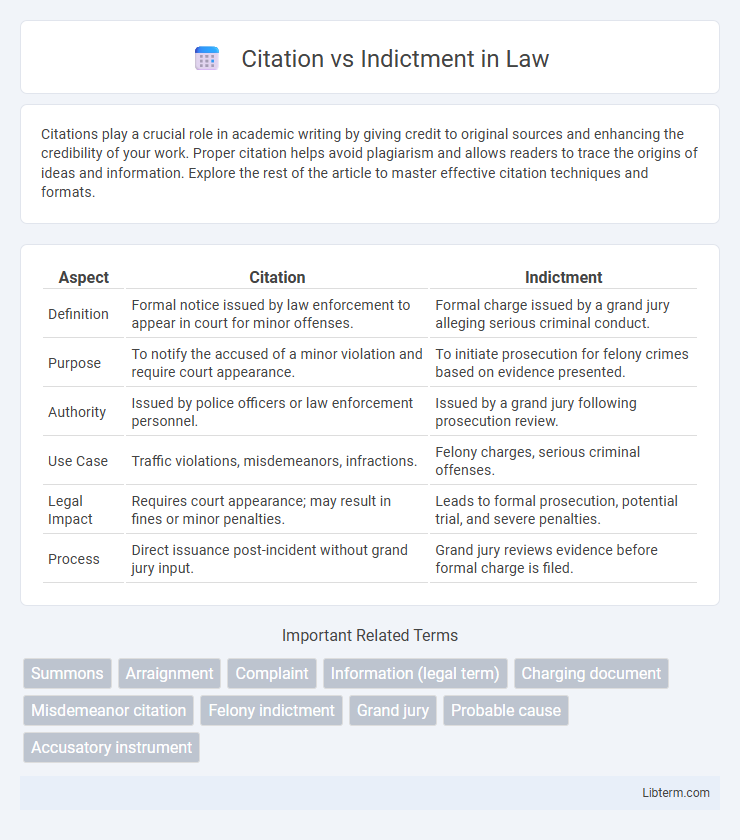Citations play a crucial role in academic writing by giving credit to original sources and enhancing the credibility of your work. Proper citation helps avoid plagiarism and allows readers to trace the origins of ideas and information. Explore the rest of the article to master effective citation techniques and formats.
Table of Comparison
| Aspect | Citation | Indictment |
|---|---|---|
| Definition | Formal notice issued by law enforcement to appear in court for minor offenses. | Formal charge issued by a grand jury alleging serious criminal conduct. |
| Purpose | To notify the accused of a minor violation and require court appearance. | To initiate prosecution for felony crimes based on evidence presented. |
| Authority | Issued by police officers or law enforcement personnel. | Issued by a grand jury following prosecution review. |
| Use Case | Traffic violations, misdemeanors, infractions. | Felony charges, serious criminal offenses. |
| Legal Impact | Requires court appearance; may result in fines or minor penalties. | Leads to formal prosecution, potential trial, and severe penalties. |
| Process | Direct issuance post-incident without grand jury input. | Grand jury reviews evidence before formal charge is filed. |
Understanding Citation and Indictment: Key Legal Terms
A citation is a formal notice issued for minor offenses, such as traffic violations, requiring the recipient to appear in court or pay a fine. An indictment is a formal charge issued by a grand jury indicating there is sufficient evidence to prosecute serious criminal offenses, leading to a trial. Understanding the distinction between citation and indictment is crucial for navigating the legal system and determining the severity and potential consequences of a legal action.
Citation vs Indictment: Main Differences
A citation is a formal notice issued by law enforcement for minor offenses, requiring the individual to appear in court or pay a fine, while an indictment is a formal charge issued by a grand jury for serious felony crimes. Citations usually involve infractions or misdemeanors, whereas indictments initiate the criminal prosecution process for major offenses. The key differences lie in the severity of the offense, the legal process involved, and the authority issuing the charge.
Legal Processes: How Citations Work
Citations in legal processes serve as formal notifications issued by law enforcement to individuals accused of minor offenses, requiring them to appear in court or pay a fine without arrest. Unlike indictments, which involve a grand jury's formal accusation for serious crimes, citations streamline resolution by avoiding extensive judicial proceedings. This mechanism expedites case handling, reduces court burdens, and maintains procedural fairness for minor infractions.
The Indictment Process Explained
The indictment process involves a formal charge issued by a grand jury after reviewing evidence presented by a prosecutor, signaling sufficient grounds to proceed with criminal prosecution. Unlike a citation, which is a minor offense notice requiring a court appearance or fine, an indictment initiates serious felony charges and triggers a more complex legal procedure. This process ensures that the accused faces formal criminal allegations based on substantial preliminary evidence before trial.
Types of Offenses: Citation vs Indictment
Citations are typically issued for minor offenses such as traffic violations or petty misdemeanors, allowing offenders to resolve the matter without arrest or court appearance. Indictments apply to serious criminal offenses, including felonies like burglary, assault, or drug trafficking, initiating a formal criminal prosecution. The severity of the crime largely dictates whether a citation or indictment is used, with citations aimed at less severe infractions and indictments reserved for more significant criminal acts.
Consequences of Receiving a Citation
Receiving a citation typically results in a fine or a summons to appear in court without immediate arrest, causing less severe legal consequences than an indictment. Citations often address minor offenses such as traffic violations and do not create a criminal record unless unpaid or contested. Failure to respond to a citation can escalate penalties, including increased fines or warrant issuance.
What Happens After an Indictment?
After an indictment, the accused is formally charged and arrested, leading to a court arraignment where they enter a plea of guilty, not guilty, or no contest. The prosecution and defense then engage in pretrial motions and discovery, preparing evidence and strategies for trial. If the case proceeds, a trial date is set, and the defendant may negotiate plea bargains or proceed to trial to determine guilt or innocence.
Rights and Legal Representation
A citation is a formal notice issued for minor offenses, allowing individuals to resolve the matter without immediate court appearance, often waiving the right to legal representation at that stage. In contrast, an indictment is a formal charge for serious criminal offenses requiring a grand jury's approval and guarantees the accused the right to legal counsel and a formal trial. Understanding these distinctions is crucial to safeguarding the defendant's rights during legal proceedings and ensuring proper legal representation.
Impact on Criminal Records
A citation typically results in a lesser impact on criminal records as it usually involves a summons to appear in court for minor offenses, often leading to fines or dismissals without a formal conviction. An indictment, however, is a formal charge issued by a grand jury for serious crimes and usually results in a criminal record upon conviction, affecting future employment and legal rights. The distinction between a citation and an indictment is crucial in understanding the long-term consequences on an individual's criminal history.
Citation or Indictment: Which Is More Serious?
An indictment is more serious than a citation because it is a formal criminal charge issued by a grand jury, indicating sufficient evidence to proceed to trial, often involving felony offenses. A citation is typically a minor legal notice for infractions or misdemeanors, requiring a court appearance or a fine but not indicating criminal guilt. The legal consequences and potential penalties associated with an indictment far exceed those of a citation, reflecting its greater severity in the judicial system.
Citation Infographic

 libterm.com
libterm.com